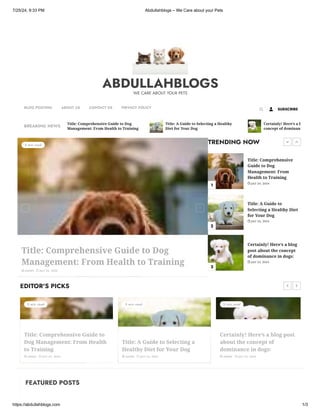We Care About Your Pets At Abdullahblogs.com
At Abdullahblogs.com You can Know Better About Your Dog Health We Care for Your Pets We strongly Care About Your Pets. Caring for dogs involves a combination of essential practices to ensure their health, happiness, and overall well-being. Here’s a comprehensive guide on how to care for your canine companion: 1. **Nutrition**: Provide a balanced diet suitable for your dog’s age, size, and activity level. High-quality commercial dog food or a vet-approved homemade diet should include protein, carbohydrates, fats, vitamins, and minerals. Ensure access to fresh water at all times. 2. **Exercise**: Regular physical activity is crucial for a dog’s physical and mental health. The amount and type of exercise vary by breed and age, but daily walks, playtime, and interactive activities like fetch or agility training are beneficial. 3. **Grooming**: Regular grooming helps maintain your dog’s coat, skin, and overall hygiene. Brushing, bathing (as needed), nail trimming and dental care (brushing teeth regularly) are essential. Long-haired breeds may require more frequent grooming. 4. **Veterinary Care**: Schedule regular check-ups with a veterinarian for vaccinations, parasite control (fleas, ticks, worms), and overall health assessments. Early detection of health issues can prolong your dog’s life and reduce treatment costs. 5. **Training and Socialization**: Basic obedience training (sit, stay, come) improves behavior and strengthens the bond between you and your dog. Socialization with other dogs and people from an early age helps prevent behavioral problems. 6. **Safe Environment**: Create a safe and comfortable living environment for your dog. Provide a cozy bed or crate, access to shelter from extreme weather conditions, and secure, hazard-free outdoor areas. Be cautious of toxic substances, plants, and foods harmful to dogs. 7. **Love and Attention**: Dogs thrive on companionship and affection. Spend quality time with your dog, offering praise, cuddles, and interactive play. Mental stimulation through toys, puzzles, and new experiences keeps them engaged and happy. 8. **Monitoring Health**: Watch for signs of illness or discomfort such as changes in appetite, energy levels, or bathroom habits. Promptly address any concerns by consulting your veterinarian. 9. **Responsible Ownership**: Adhere to local regulations regarding dog ownership, including licensing and identification (microchipping). Respect others by preventing excessive barking and picking up after your dog in public spaces. 10. **Emergency Preparedness**: Have a plan in case of emergencies, including natural disasters or sudden health crises. Keep a first aid kit for pets and know where the nearest emergency veterinary clinic is located. By following these guidelines, you can ensure that your dog lives a happy, healthy life as a cherished member of your family.
Related slideshows
